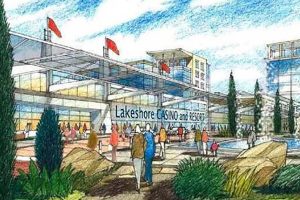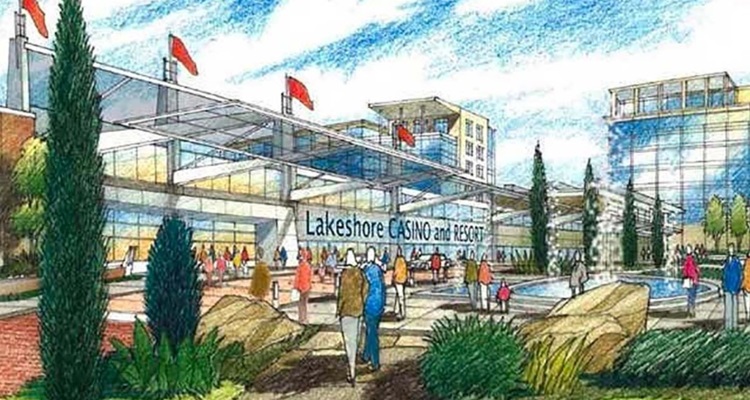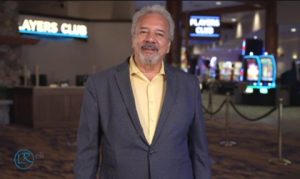In Michigan, the Little River Band of Ottawa Indians is inching closer to securing final authorization for their proposed tribal casino in Muskegon County after on Thursday receiving land trust approval from the federal government.
The proposed development is located approximately 90 miles south of the tribe’s established casino in Manistee.
After more than a decade of working on the project, the Department of Interior (DOI) Bureau of Indian Affairs (BIA) is reportedly expected on Friday, Oct. 23, 2020, to formally publish in the Federal Register a Notice of Availability of a Final Environmental Impact Statement (FEIS) for the tribe’s casino project at the former Great Lakes Downs racetrack site in Fruitport Township.
According to one local source, Little River Band of Ottawa Indians’ Ogema, Larry Romanelli (pictured below), said…
“This is an incredible step forward in our process to build the Muskegon County Casino Project. This was the big one and this basically to me tells me we’re going to have a casino here in Muskegon.”
EIS considerations:
The BIA reportedly considered both the Little River Band’s proposed casino project and a range of economic development alternatives in the FEIS and arrived at the conclusion that the proposal by the tribe, which is based in Manistee and Mason counties in northwest Michigan, proposal is the preferred alternative of the federal government.
After a 30-day public comment period, the BIA will issue its final decision on the application, after which the process advances to the State of Michigan for consideration by Gov. Gretchen Whitmer and finally, Legislative response.
According to reports, the $180 million development is estimated by the tribe to create 3,000 new jobs, including 1,500 full-time positions and 1,500 constructions and ancillary jobs, for the Muskegon community.Anticipated opening:
While additional approvals are still needed at the state level, if all goes according to plan, within three years the tribe will be able to open its gaming facility at Harvey Street in Fruitport Township. The gaming and economic development would reportedly include nearly 70,000 sq ft of gaming space, with 1,700 slot machines, 35 table games, a 220-room hotel with event and meeting room space, and dining and entertainment options.
Project history:
The federally recognized tribe purchased 233 acres of land at and around the former Great Lakes Downs racetrack site in Fruitport Township in July 2008 and after a five-year lull, a decision by then Gov. Rick Snyder was made in October 2013, to allow federal review and permitting process to take place.
Tribal leaders had reportedly waited for over a year for the governor to approve the Section 9 wavier, which would allow the casino proposal to advance to the federal government for consideration, and after the proposal was reviewed and ruled on by the Department of Interior, it would make its way back to the governor for his [Snyder] consideration.
Opposition:
A hearing for an EIS was held on October 15, 2015, by the BIA as part of the casino proposal application, and at that time, tribal leaders including Romanelli were optimistic. Meanwhile, located approximately 100 miles away from Muskegon, the Saginaw Chippewa Indian Tribe, which owns and operates the Saganing Eagles Landing Casino and Soaring Eagle Casino in Standish and Mount Pleasant, were among the proposal’s staunchest objectors.
Fast forward to March 2019, and in addition to the Saginaw Chippewa, the Nottawaseppi Huron Band of the Potawatomi, and Gun Lake tribes, which own casinos in Battle Creek and Wayland Township, are also trying to stop the casino from being built.
James Nye, a spokesman for the three tribes, reportedly said at the time…
“We’re trying to educate our employees that due to this proposed casino, there would be a substantial loss in our ability to provide jobs.” He said the proposed casino would result in a loss of revenue for the other tribes and subsequently the revenue they share wit 7BALL h their respective communities.
Gun Lake Casino reportedly went so far as to label the proposed casino a threat, sending an email encouraging its employees to voice their opposition.
Responding to the rival tribe’s action, Romanelli (at the time) said…
“Which I think is unfortunate. You know, from our tribes perspective, we’ve never been against any other tribes’ efforts to get a casino. Matter of fact, we wrote a letter of support for Gun Lake back in the day and some of these same accusations were used again when Gun Lake was trying to open their casino.”




